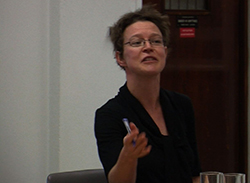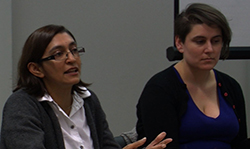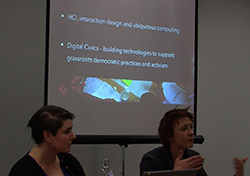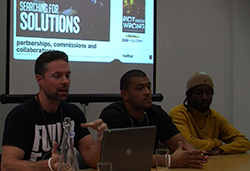Activism Event Report & Videos
Our first gathering took place in November 2013, attended by more than 70 people. The meeting was kindly hosted by the Human Rights Consortium at the University of London, ironically at Senate House where only weeks later students were punched by the police for occupying the building in attempt to bring attention to the extremely low pay and zero hours contracts that are experienced by many sections of people working at universities, which are being fought by the 3Cosas Campaign. At this initial meeting academics, teachers, activists, community organisers, community workers, students, independent sociologists and researchers came together, discussed, argued, and agreed that there is a need for ‘something’.
The meeting agreed that there are no easy answers, but there is a desperate need within our discipline to work together, network and defend the work many of us already undertake, and highlight the fight for social justice through our discipline. Imogen Tyler and John Holmwood both spoke of the need for a new vocabulary in how we resist inequalities through our discipline, and through bringing different groups and publics together. These ideas were built upon by speakers from WestGAP (Glasgow based anti-poverty group) and POW (Nottingham based sex workers outreach group). Ashli Mullen and Steff Allan from WestGAP noted the need to combine sociological expertise with ground roots knowledge; moreover they succinctly highlighted the problematic stance of sociologists giving ‘voice’ to research participants or indeed anyone with a lesser power basis. The WestGAP speakers argued forcefully that sociologists should stop this practice as it essentially engenders a situation where the powerful remain dominant. The role of sociologists in academia should therefore be to help make audible the already-present voices of activists and participants. Likewise Daniela Scotece from POW emphasized the need for academics to be committed to projects in a long-term manner, and to provide nuance and care. Videos of their contributions to the meeting are below, together with the workshops that focused on working in and with communities and inter-disciplinary cooperation.

Unfortunately, for the workshop on working with the media and the final session introduced by Yvette Taylor, our technical skills failed us and we can’t offer a video of the speeches, but we can assure you they offered excellent contributions and stimulating discussion.
In the media workshop, Gurminder K Bhambra and Hannah Jones spoke about how an outraged conversation on Twitter in the summer of 2013 led to a loose group of activists, academics and activist-academics coming together to conduct  a piece of 'flash research' about the UKBA 'Go Home' campaign, followed by a successful application for one of the new ESRC Urgency grants to investigate in more detail how the Go Home vans were perceived in the London boroughs where there were piloted. There are important lessons here about the need for academics to find ways to operate outside institutional frameworks where necessary, but also about the need to be creative and optimistic about the potential to access research council funding for critical, activist research.
a piece of 'flash research' about the UKBA 'Go Home' campaign, followed by a successful application for one of the new ESRC Urgency grants to investigate in more detail how the Go Home vans were perceived in the London boroughs where there were piloted. There are important lessons here about the need for academics to find ways to operate outside institutional frameworks where necessary, but also about the need to be creative and optimistic about the potential to access research council funding for critical, activist research.
 Following this, Clara Crivellaro spoke about the research that she and others at Newcastle University's Culture Lab are doing to understand activism in the digital age and to use digital technologies to facilitate grassroots democratic engagement. This raised provocative ideas about whether, sometimes, sociologists should take as their starting point the needs of activists, and develop research to meet the needs they identify.
Following this, Clara Crivellaro spoke about the research that she and others at Newcastle University's Culture Lab are doing to understand activism in the digital age and to use digital technologies to facilitate grassroots democratic engagement. This raised provocative ideas about whether, sometimes, sociologists should take as their starting point the needs of activists, and develop research to meet the needs they identify.
 The last speakers in the session, Teddy, Fidel and Philistia from Fully Focused Productions, generated a huge amount of enthusiasm, as they spoke about the Riot from Wrong documentary and the importance of being ready to respond immediately to unexpected developments in order to promote the voices of sections of society that are often ignored by the mainstream media.
The last speakers in the session, Teddy, Fidel and Philistia from Fully Focused Productions, generated a huge amount of enthusiasm, as they spoke about the Riot from Wrong documentary and the importance of being ready to respond immediately to unexpected developments in order to promote the voices of sections of society that are often ignored by the mainstream media.
The discussions which took place at Senate House in November and through emails, twitter, and blogs since have highlighted a gap in our network as Sociologists and within the BSA. We have recognised that Sociology is uneasy with the relationship with activism even in its broadest terms, yet activism has been thrust upon us through the aggressive marketization of HE.
We accept as a network we are limited, however we acknowledge our diversity, and our ability to bring together complex and multiple activities. Our aim now through the Activism in Sociology Forum is to develop a publically engaged sociology that people can understand, we aim to be committed to public sociology through activities in schools, communities, political circles, and within the media. At the end of the November meeting, 16 new people came forward to make a commitment to joining the convenors in making things happen within the forum, and so far 162 people have joined the ASF jiscmail list, and everybody is free to get involved, whether or not you are a member of the BSA.
At the Senate House meeting and through conversations since many issues have arisen of what and how we might tackle inequalities through our network. The November meeting proposed that the forum adopt a decentralised network approach, to provide a space for the efforts of individual members or groups of members to be discussed and publicised, without imposing a centralised agenda. Some of the issues that members have said they want to address, or are already addressing, include:
- Tackling restrictions on research funding through the ‘Impact agenda’
- Tackling the major problem for sociology that ‘non-traditional’ students are struggling to get into HE and adult education has been all but destroyed
- Addressing the fading out of subjects that were popular with ‘non traditional’ students, in particular mature students
- The issues and problems with open access
- Increasingly precarious conditions of employment for university staff
- Our under-utilised wealth of resources of academics who are both activist and retired
As the convenors of the ASF we now propose creating an Activism in Sociology Forum webpage, where we can sign up with our bio’s, what we are prepared to do what we would like to do, what we can realistically do, and what we already do, maybe in the form of mission statements. This will help us to network together, form alliances and also to make ourselves more visible and available to other activist and community groups. We encourage other members of the forum to come forward with your ideas, and to share what you are doing.
Our next physical meeting will be at the BSA Annual Conference in April 2014. We are planning a Presidential Event with John Holmwood on the Legacy of Stuart Hall and where we go from here, a fringe event at the BSA conference, probably in the back room of a pub somewhere in Leeds. All will be welcome at the Presidential Event and Fringe, whether or not you are a member of the BSA or have paid to attend the conference.
